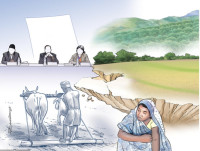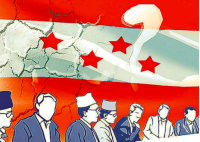Opinion
More action, less words
The new constitution should be amended immediately to address the Tarai agitation
Prakash Bom
Almost all the senior leaders of the main political parties have been claiming that the new constitution of Nepal is the most inclusive in all of South Asia. This despite the fact that the agitation in the Tarai led by Madhesi and Tharu leaders has continued for more than 100 days. At the same time, all the senior leaders, including the sitting prime minister, have admitted that some of the provisions in the constitution need immediate and serious amendments to address the Tarai unrest.
To this day, however, none of them has taken any steps towards this end, except for the erstwhile Nepali Congress government which registered two amendment proposals. Unfortunately, the present CPN-UML led government has not given any priority to them. If they had just amended Article 42 under Right to Social Justice that would institutionalise the principle of proportional inclusiveness, and Articles 84 (1) (a) and 286 (5) (6) that would determine population-based electoral constituencies except in a few under-populated places, perhaps the Tarai movement would have taken a different political direction, and people would have been spared much suffering.
Suffer the people
The government’s failure to anticipate the consequences of the Tarai agitation has made life hard for the common citizens who are finding it difficult to make ends meet. The country’s economic activities have slowed down drastically and given rise to rampant black marketing. Yet, the leaders of the main political parties are busy making bombastic speeches against India, and not doing anything to resolve the political stalemate.
The government and the bureaucrats, who should be working to protect the basic rights and freedom of the citizens, have actually made their lives miserable. For example, motorists are being forced to buy gasoline on the black market by paying almost three times the regular price. The government has failed even while receiving thousands of litres of free petrol from China. It is obvious that the government has been letting black marketers take advantage of the situation, and forcing the public to pay more for gasoline, cooking gas and other essential commodities. In such a situation, it cannot be said that the rule of law is being followed.
The blame-game stratagem of the main political parties has had very little effect. Nepal’s idealised socialist nationalism cannot replace its southern neighbour; it will always be India. The truth is that Nepal cannot sustain itself without the market south of the border. Is up to politicians and policymakers to ensure that Nepal has balanced trade with its neighbours. They should not just react at times of crisis by falsely claiming that Nepal can sustain itself without the Indian market. Besides, such an irresponsible outlook reflects lack of capacity for deductive reasoning.
Amend the statute
If Article 42 under Right to Social Justice is not amended by adding the principle of proportional inclusiveness, there will be no specific method to implement it with fairness. Besides, if the proportional method is applied to a particular ethnic group or gender, there must be baseline data of the entire population. So without the principle of proportional inclusiveness, the article will have no specific system or method to guarantee the right to social justice. There must be a standard for a system to develop specific regulations or policy to implement the provision. If Articles 84 and 286 are not amended to create population-based electoral constituencies, there will be further conflict as it will allow the main political parties and their senior leaders to manipulate the formation of constituencies.
This constitution can be successfully implemented if its provisions are amended as required. The generalised provisions need to be revised. The senior leaders of the political parties that pushed the constitution through the Constituent Assembly like to repeat that it is the most inclusive constitution in South Asia, and that it was passed by more than 90 percent of the representatives. Nonetheless, they have all admitted that the new document needs serious and immediate amendments to address the demands of the Madhesi and Tharu movements.
Bom is a freelance writer at Global Politician, an independent journal of politics and world affairs




 18.12°C Kathmandu
18.12°C Kathmandu










